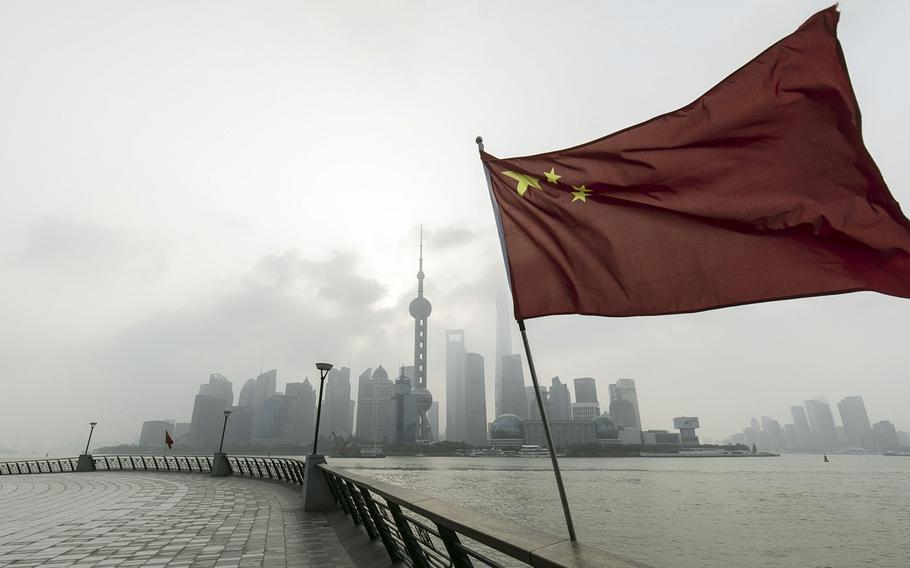
A Chinese flag in front of buildings in Pudong’s Lujiazui Financial District in Shanghai on Oct. 17, 2022. (Qilai Shen/Bloomberg)
It was the year that the scales fell from Europe’s eyes on China. Heading into 2023, the clarity engendered by Beijing’s stance on the Russian invasion of Ukraine is in danger of being lost. Leaders of a continent beset by soaring energy prices and economic hardship show signs of wanting to pick up again with the world’s largest trading nation as if nothing has happened. That would be a mistake. Wishful thinking was never the basis of a sound relationship.
It’s worth recapping to see just how the tone has changed since Vladimir Putin’s troops crossed into Ukraine in late February. The attack came less than three weeks after Chinese leader Xi Jinping proclaimed a “no limits” partnership with Russia that amounted to a blueprint to remake the rules-based international order. After the invasion, Beijing professed to be neutral and reiterated its respect for territorial integrity and sovereignty. But it has consistently refused to criticize Russia. Officials blamed the U.S. for the conflict and state media echoed its pro-Moscow narrative, while excluding reports of Ukrainian suffering. It is clear where the Chinese government’s sympathies lie.
China’s Communist Party has never hidden its hostility to the liberal values that underpin the U.S.-led world order, though that antipathy has acquired increased openness and confidence under Xi. For Europe, witnessing the largest military conflict on its soil since the end of World War II, China’s de facto support for Russian aggression gave a new level of reality to that clash of values. Perhaps the most striking expression of the shift in consciousness that this produced came from European Commission Vice President Josep Borrell who, in a speech after April’s EU-China Summit, called it a “dialogue of the deaf.” The 75-year-old former Spanish foreign minister went on:
“China wanted to set aside our difference on Ukraine — they did not want to talk about Ukraine. They did not want to talk about human rights, and other issues, and instead focus on the positive things. The European side made clear that this ‘compartmentalization’ is not feasible, not acceptable. For us, the war in Ukraine is a defining moment for whether we live in a world governed by rules or by force. That is the question. We condemn the Russian aggression against Ukraine and support this country’s sovereignty and democracy — not because we ‘follow the U.S. blindly,’ as sometimes China suggests, but because it is our own position, our genuine position, we believe in that. This was an important message for the Chinese leadership to hear.”
Compare that impassioned statement of European principle with the comments of French President Emmanuel Macron after his meeting with Xi at the Group of 20 gathering in Bali in November. Macron said he was convinced China could play “a more important mediating role” in Ukraine in the coming months. At the subsequent Asia-Pacific Economic Cooperation forum in Thailand, he called for engagement with Beijing and urged Europe to take a middle path between the “two big elephants” of the U.S. and China.
That will have given satisfaction to Xi, who also met Mark Rutte of the Netherlands, Spanish Prime Minister Pedro Sánchez and Italy’s Giorgia Meloni in Bali. China has concentrated efforts on driving a wedge between Europe and the U.S., and tensions over Washington’s green energy incentives and semiconductor restrictions have given it an economic opening. Macron intends to visit Beijing in the new year, following in the steps of German Chancellor Olaf Scholz, who took a delegation of top business executives to the Chinese capital in early November.
All this will sit uneasily with those who see China’s position on Ukraine as fundamentally altering the security equation for Europe (Chinese officials including Xi have expressed periodic disquiet over the course of the war, though have never relinquished their pro-Russian stance). Days before traveling to Beijing, Scholz’s government agreed to sell a stake in a Hamburg port terminal to China’s state-owned Cosco Shipping Holdings Co. — a decision that put Germany’s leader at odds with his economy, foreign affairs, finance, transport and defense ministers, as well as the country’s security services.
In early December, Scholz penned a 5,000-word article in the U.S. magazine Foreign Affairs that said the world is facing a Zeitenwende, or an epochal tectonic shift, as a result of Russia’s war on Ukraine. The piece denounced Putin’s aggression and defiance of the principles of the United Nations charter, and contained some stirring affirmations of democratic values in the face of authoritarian challenges. Scholz devoted a section to China, saying its growing power doesn’t justify claims to hegemony in Asia and criticizing the country’s turn away from openness. But, he wrote, China’s rise doesn’t warrant isolating Beijing or curbing cooperation. Not a single sentence in this long essay places China and Russia together, or addresses Beijing’s stance on Ukraine. This looks a lot like the compartmentalization that was unacceptable to Borrell back in April.
The EU and China have a $700 billion trade relationship. Such a vast economic entanglement makes it necessary to talk and cooperate, where possible. The tone of some European leaders, though, hints at a view of Beijing that is looking distinctly outmoded: a regime that, nominally, is an ideological rival, but one that can be kept onside and coaxed through trade and investment links. It’s reminiscent of how Germany once viewed Putin’s Russia. We know how that worked out. There would be no excuses for repeating the mistake.
Matthew Brooker is a Bloomberg Opinion columnist covering finance and politics in Asia. This column does not necessarily reflect the opinion of the editorial board or Bloomberg LP and its owners.